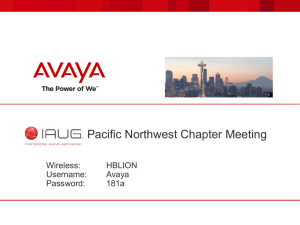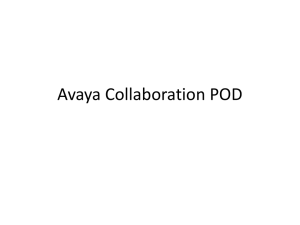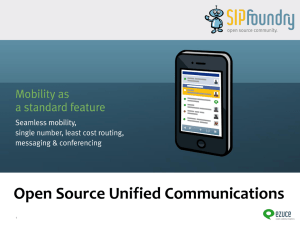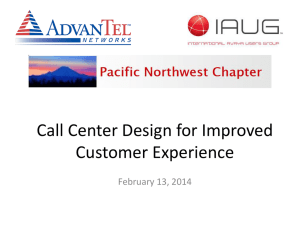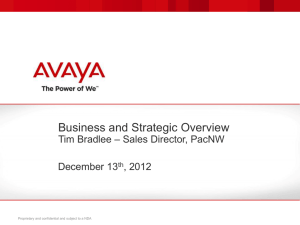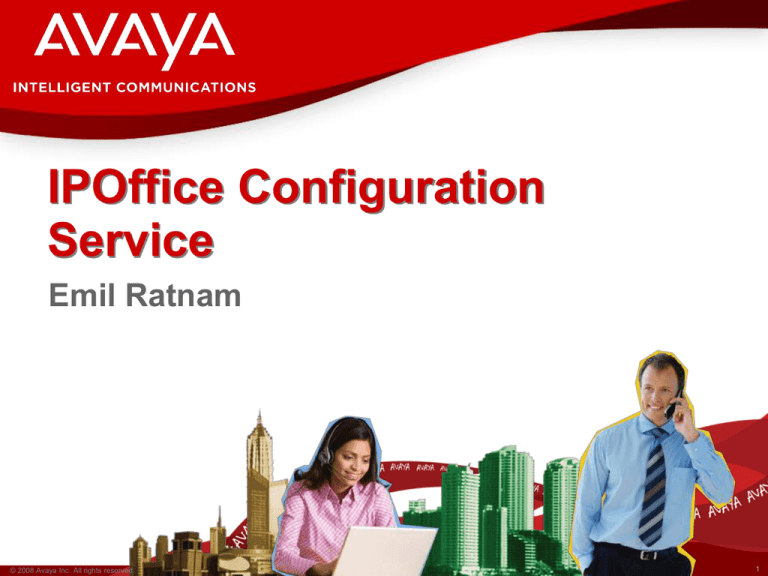
IPOffice Configuration
Service
Emil Ratnam
© 2008 Avaya Inc. All rights reserved.
1
Content
Background
Overview
Software
XML Format
Configuration Examples
Demo
© 2008 Avaya Inc. All rights reserved.
2
Background
This was developed in response to a request by a
Service Provider to be able to empower their
customers to make simple changes to their config
which would not require a reboot
It is not a replacement for Manager
© 2008 Avaya Inc. All rights reserved.
3
Overview
Web Service interface that can be hosted with or without
IIS, that enables update, add, delete operations on a subset of the User and Group configuration:
– User
• Name, Full Name, Password, Extn Number, Voice Mail (On/Off), Voice
Mail Password, Can Intrude, Cannot Be Intruded, X-Directory.
• User Rights Template - Ability to apply a defined template
• Button Programming - 33 Features supported.
– Group
• Name, Extn Number, No Answer Time, Voice Mail Answer Time,
Ring Mode (Rotary,..), Voice Mail On, Voice Mail Password.
• Group Membership
© 2008 Avaya Inc. All rights reserved.
4
Overview
Two methods are exposed by the service interface.
Both methods work by supplying or consuming an
XML document
– GetUnitConfiguration
• Returns the supported User and Group entities and
their supported fields
– SetUnitConfiguration
• Makes configuration changes based on an “Opp”
(Operation Code) which can be one of the following,
Add, Update, Delete
© 2008 Avaya Inc. All rights reserved.
5
Overview
Utility method is also available which can be used
to check that the IP Office is reachable
– ConnectAndGetUnitDetails
• Returns some basic information about the IP Office
IP Office needs to be configured for secure
communications using the security settings of the
Manager Application
© 2008 Avaya Inc. All rights reserved.
6
Software
2 zipped files available
– IPOCfgSvr_V1.0.0.1.zip, IPO_XML_Sample.zip
IPOCfgSvr_V1.0.0.1.zip
– Contains the API implementation
IPO_XML_Sample.zip
– Contains a sample host and a sample client,
ConfigServiceHost.exe, WSClientTestHarness.exe
– Used to test the API and therefore should not be considered as
production software
© 2008 Avaya Inc. All rights reserved.
7
XML Format
The XML document is based on the format retrieved as a
result of the GetUnitConfiguration
<?xml version="1.0" encoding="utf-8"?>
<AvayaIPOConfiguration>
<Users>
<User Guid=”cf4b99005f3511d80b100e007026702” >
</User>
</Users>
<Groups>
<Group Guid=”cf4b99005f3511d80b100e007026702”>
</Group>
</Groups>
</AvayaIPOConfiguration>
© 2008 Avaya Inc. All rights reserved.
8
Configuration Examples
Object is represented by 2 attributes
– GUID(its unique key) and operation to be performed
The following format is used to change the full name of a
User
<AvayaIPOConfiguration>
<Users>
<User Guid=”cf4b99005f3511d80b100e007026702” Opp=“Update” >
<FullName>Jack Sparrow</FullName>
</User>
</Users>
</AvayaIPOConfiguration>
© 2008 Avaya Inc. All rights reserved.
9
Configuration Examples
The following format is used to add a new button for a User
<AvayaIPOConfiguration>
<Users>
<User Guid=”cf4b99005f3511d80b100e007026702” Opp=“Update” >
<DSSKeys>
<DSSKey Key=“4" Opp="Add">
<Label />
<ActionObject>Directory</ActionObject>
</DSSKey>
</DSSKeys>
</User>
</Users>
</AvayaIPOConfiguration>
© 2008 Avaya Inc. All rights reserved.
10
Configuration Examples
The following format is used to change the user rights
template of a User
<AvayaIPOConfiguration>
<Users>
<User Guid=”cf4b99005f3511d80b100e007026702” Opp=“Update” >
<UserRights>CustomUser</UserRights>
</User>
</Users>
</AvayaIPOConfiguration>
© 2008 Avaya Inc. All rights reserved.
11
Configuration Examples
Group configuration changes
<?xml version="1.0" encoding="utf-8"?>
<AvayaIPOConfiguration>
<Groups>
<Group Guid="73aaad8049ee11d5832200e007026702" Opp="Add">
<Name>Mark</Name>
<Extn>400</Extn>
<GroupRingMode>Sequential</GroupRingMode>
<Members>
<Member Extn="201" Opp="Add">
<Enabled>true</Enabled>
</Member>
<Member Extn="202" Opp="Add">
<Enabled>true</Enabled>
</Member>
</Members>
</Group>
</Groups>
</AvayaIPOConfiguration>
© 2008 Avaya Inc. All rights reserved.
12
Usability
Acts as middleware, you integrate and deploy as
part of your solution:
– Standards, supports WS-I Basic Profile 1.0
(interoperability)
• Hosted on Windows, using the “Window Communications
Foundation” (WCF), provides a rich and configurable stack.
• Can be hosted on same machine or distributed, using any 32 bit
Windows OS that supports .Net 3.0 (Workstation or Server).
• Utilise XML to represent the data and effect changes, rich
validation.
Current Scenarios
– Self Service Portals, Hospitality
• Stateless, scalable to service provider deployments
• Verticals – Hospitality, Patient Care (Phone Services).
© 2008 Avaya Inc. All rights reserved.
13
Demo
© 2008 Avaya Inc. All rights reserved.
14
© 2008 Avaya Inc. All rights reserved.
15

